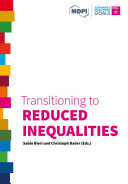Product desciption
Transitioning To Reduced Inequalities Sabin Bieri Christoph Bader by Sabin Bieri, Christoph Bader 9783039211609, 3039211609 instant download after payment.
The world has never been richer than today. The distribution of our global wealth, however, is hugely biased. Since 1980, the gains were mainly captured by the rich: The top 1% obtained twice as much of the income growth as compared to the bottom 50%. Nevertheless, within economics, debates about inequality have remained rather marginal, despite long-term research by renowned scholars such as Tony Atkinson. Within the public arena, concerns about inequality emerged as a result of a number of developments: First, the global financial crisis in 2008 exposed the risks of the financing of the economy; secondly, 2013, Thomas Picketty’s book “Capital in the 21st century” demonstrated that, against the trend of the overall 20th century, capital returns outstrip the gains through economic growth in recent decades, thus threatening social coherence and democratic institutions and thirdly, the Millennium Campaign presented impressive achievements regarding poverty but stirred doubts whether the most deprived were left even further behind. Since 2015, then, the stated aim of SDG 10 is to “reduce inequality within and among countries”. There is growing consensus that economic growth is not sufficient to reduce poverty, and that our efforts to make it more inclusive so far were insufficient. The very first step reduce inequality is to adopt a systemic perspective, allowing an integrative analysis covering both ends of the ladder. Policies should be universal in principle and pay attention to the needs of disadvantaged and marginalized populations. Predicated on comparison, inequality reminds us that it’s not enough to study lower earners and the poor. Instead, the term demands that we expand our perspective, scrutinizing how economic value is generated, accumulated, at whose cost, and – not least – how the overall system could be made fairer. “Transitioning to Reduced Inequalities” therefore explores inequality trends worldwide, offers a debate on different measures and comparative perspectives, highlights key actors who either benefited or suffered from recent economic trends, and explores policy options to reduce inequality and thus contribute to SDG 10. The volume considers particularly: conceptual frameworks with regards to the inequality debate; the relationship between poverty reduction, economic growth and inequality; measures of inequality; overlooked/bypassed groups in developing countries; analysis on income/wealth growth for different groups in the global north; discussion about policies to reduce inequality; and further research in the realm of inequality. Transitioning to Reduced Inequalities is part of MDPI's new Open Access book series Transitioning to Sustainability. With this series, MDPI pursues environmentally and socially relevant research which contributes to efforts toward a sustainable world.


